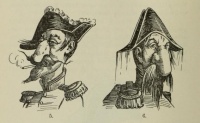Odor
From The Art and Popular Culture Encyclopedia
|
"THE IDEA OF writing a book about the perception of odors came to me as I was reading the memoirs of Jean-Noel Halle, a member of the Societe Royale de Medecine under the ancien regime and the first incumbent of the chair of public hygiene established in Paris in 1794."--incipit The Foul and the Fragrant (1982) by Alain Corbin "In 1915 Dr. Edgar Berillon conveniently 'discovered' that Germans had intestines nine feet longer than all other humans, as well as being prone to polychesia (excessive defecation) and bromidrosis (body odour), by which criteria Berillon was able to uncover German spies and Germans masquerading as Alsatians. However absurd this pushing of racial ideas to their utmost extremes may now appear, it was nevertheless long possible to appear both erudite and scientific."--A History of French Passions 1848-1945: Intellect, Taste, and Anxiety (1993) by Theodore Zeldin |

Illustration: Napoleon III nose caricatures from Schneegans's History of Grotesque Satire
|
Related e |
|
Featured: |
An odor is caused by one or more volatilized chemical compounds that are generally found in low concentrations that humans and animals can perceive by their sense of smell. An odor is also called a "smell" or a "scent", which can refer to either a pleasant or an unpleasant odor.
While "odor" can refer to pleasant and unpleasant odors, the terms "scent", "aroma", and "fragrance" are usually reserved for pleasant-smelling odors and are frequently used in the food and cosmetic industry to describe floral scents or to refer to perfumes.
In the United Kingdom and other Commonwealth, English-speaking nations, "odour" refers to scents in general—without positive or negative connotations; but in the United States, and for many non-native English speakers around the world, "odor" generally has a negative connotation as a synonym for "stink".
Further reading
- Die sexuelle Osphresiologie (1901) by Albert Hagen
- Odoratus Sexualis: A Scientific and Literary Study of Sexual Scents and Erotic Perfumes (1933) by Iwan Bloch
See also
- Aroma compound
- Body odor
- Indole, skatole
- Olfaction
- Odor di femina
- Olfactory art
- Olfactory fatigue
- Olfactometer
- Machine olfaction
- Scented water
- Zola and olfaction

